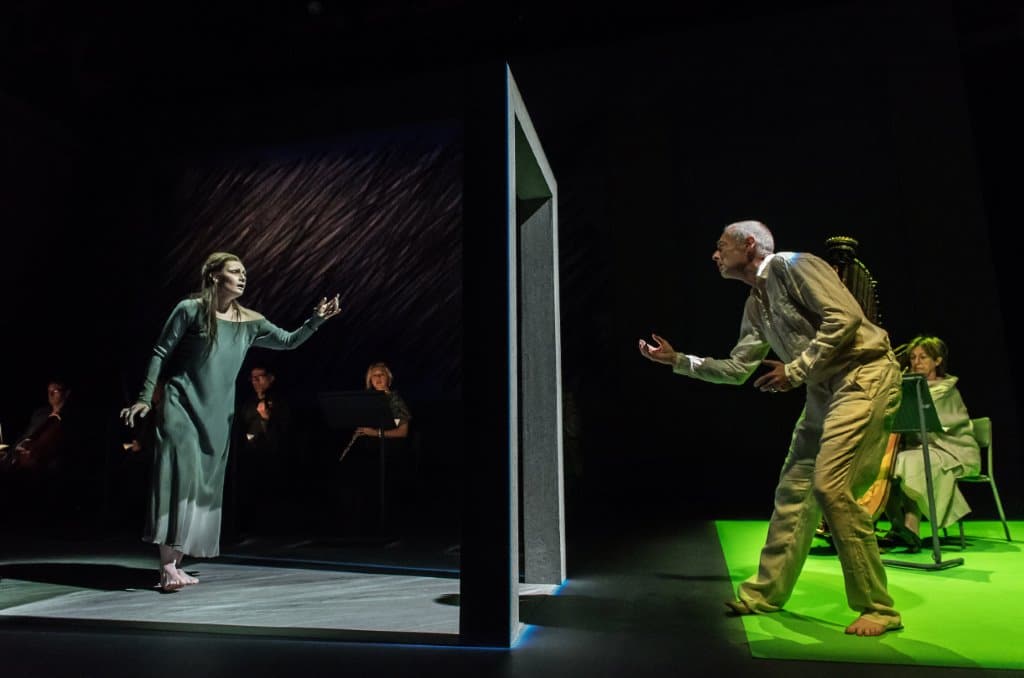In his youth, Harrison Birtwistle (1934) was one of the Angry Young Men of English music, he has since been elevated to the peerage and goes by as 'Sir Harry'. He trained as a clarinetist and composer at the Royal College of Music in Manchester, where he was annoyed by the conservative climate. Together with John Ogden, Alexander Goehr and the recently deceased Peter Maxwell Davies, he founded the ensemble New Music Manchester in 1952.
They emphatically sought a connection with the continental avant-garde: they went to Darmstadt - the Mecca of new music - and promoted serialism and twelve-tone music at home. They also poked their light in London, with the idiosyncratic Elizabeth Lutyens. She was the only one of the older generation to embrace the twelve-tone technique; she was mockingly called 'twelve-tone Lizzy' mentioned. Naturally, the rebels renounced the 'Land of Hope and Glory' aesthetic of their predecessors in their own compositions. Instead, they wrote radical pieces, shaking up British musical life.
Punch throws own baby into the fire
High or low point, it depends on which point of view you approach it from, was the world premiere of Birtwistle's one-act play Punch and Judy in 1968, at the Aldeburgh Festival put on by Benjamin Britten. In this English version of Punch and Judy, the protagonist emerges as a ruthless serial killer, even throwing his own baby into the fire. Britten - along with his partner Peter Pears - reportedly left the hall during the interval, shocked by the violence on stage and from the orchestra pit.
As it is with rebels, they often become milder as the years go by. This is also true of Birtwistle, who scored high marks in 1986 with his first full-length opera, The Mask of Orpheus. Herein the well-known myth of Orpheus, who tries in vain to retrieve his beloved Eurydice from the underworld, is presented from different perspectives. The last act is sung in a fantasy language. This considerably more lyrical opera was received - oh irony - as the 'new Peter Grimes', Britten's most popular music drama.
Again and again Orpheus
The Orpheus theme continued to fascinate him and in 2004 Birtwistle wrote his gripping 26 Orpheus Elegies for oboe, harp and countertenor, a setting of poems by Rainer Maria Rilke and comments on them. Four years later, he returned again to this beloved Greek story, in the small-scale chamber opera The Corridor. In it, the story is told from the perspective of Eurydice. The play was performed in 2010 at the Holland Festival by Asko|Schönberg conducted by Reinbert de Leeuw, with soprano Elizabeth Atherton as Eurydice and tenor John Graham Hall as Orpheus.
At the time, the one-act formed a convincing double-bill with the cycle Semper Dowland, semper dolens, a series of arrangements of lute songs by John Dowland (c 1563-1626). In these, Birtwistle aptly manages to put the all-important melancholy of the British 'Orpheus' in a modern musical setting. Thanks in part to Pierre Audi's atmospheric mise-en-espace, it was an unforgettable performance.

Now the Holland Festival is placing The Corridor next to The Cure, which had its world premiere in 2015 at, yes, the Aldeburgh Festival. Birtwistle composed this chamber opera as a counterpart to The Corridor and for this, too, David Harsent provided the lyrics.
Once again, it zooms in on a defining moment in a Greek myth: the moment when Medea gives her father-in-law Aeson back his youth. - At which point he becomes suspiciously similar to her husband Jason and she finds, to her dismay, that she desires both. Atherton sings the lead role again this time, with tenor Mark Padmore as a counterpoint. London Sinfonietta is directed by Geoffrey Paterson, with Martin Duncan signing on to direct.
The British press did not react unreservedly positively. There was widespread appreciation for Duncan's direction and Birtwistle's music, but lacked urgency in The Cure. The on the Metamorphoses of Ovid-based story "is less familiar than that of Orpheus and more difficult to form into a coherent play", judged renowned critic Andrew Clements. Also troublesome, in his opinion, is the constant switching between Jason and Aeson. This lacks The Cure 'the dramatic focus' of The Corridor, opening the evening.
If the Holland Festival's site is to be believed, however, a "throat-cutting double bill" awaits us. On Thursday 9 and Friday 10 June, we can watch the show in Muziekgebouw aan 't IJ make our own judgements.
